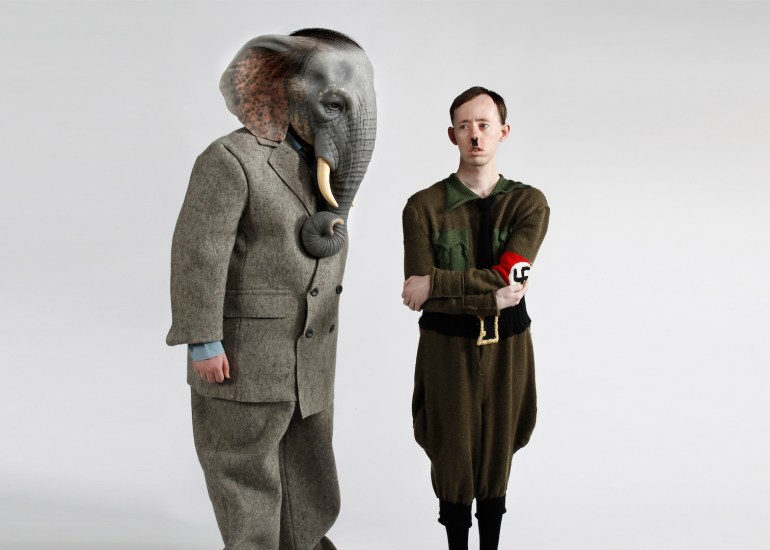‘Ganesh Versus the Third Reich’.
Who has the right to tell certain stories? Who has the right to play certain characters?
They’re questions, within industry conversations of diversity, inclusivity and authentic storytelling, that are raised often.
And they’re questions at the heart of Back to Back Theatre’s play Ganesh Versus The Third Reich, which the company is adapting for the screen thanks to a $100,000 development grant from arts agency Creative Victoria.
Back to Back Theatre, based in Geelong, is a theatre company that employs an ensemble of actors with intellectual disabilities. Its first foray into screen was 2017’s Oddlands, a 30-minute pilot produced with Matchbox Pictures for the ABC, a product of Adelaide Film Festival, ABC Arts, the Australia Council and Screen Australia’s HIVE initiative. A further six-part series is now currently in development at Matchbox.
However, when Back to Back director Bruce Gladwin first looked at moving to screen, he’d originally set out to adapt Ganesh Versus The Reich. It’s a play which the company has performed in in 35 cities worldwide, garnering eight national and international awards, including the 2012 Helpmann Award for Best Australian Play.
Essentially, a ‘play within a play’, Ganesh Versus The Reich follows the staging of a performance in which the Hindu deity Ganesh travels to Nazi Germany to reclaim the swastika, a Sanskrit symbol. Throughout, the actors break character, asking the director if they have the right to be performing it; none of them are Jewish, none are Hindu.
Gladwin describes the play as a story “essentially about power and control”. The Nazi’s mass murder of people with disabilities, the T4 program, sits close to its surface; a Josef Mengele character talks of his fascination with “the abnormal, defects, dwarfs, mongoloids, degenerative conditions”. There are parallels drawn between the Nazis and the oppressive nature of the able-bodied director towards the actors.
“There’s a kind of poignancy with all of this, in that Ganesh is the god of overcoming obstacles. There’s a pertinence to that in terms that the characters that are telling the story are characters with disabilities, represented by by actors with those disabilities, and the forces that they’re up against in one narrative are reflected in the meta-narrative,” Gladwin tells IF.
However, in adapting the work for screen, Gladwin hopes to add in a third layer. Before the company debuted the play at the Melbourne Festival in 2011, there were calls from Hindu communities, led from the United States, to shut the play down.
“People had concerns about the image of in Ganesh in the Melbourne Festival program. There was a kind of protest to close the show down, and as a result of that we engaged in quite a substantial dialogue with the Hindu community in Australia. That aspect of us a company going through that experience and having that engagement, is an element that we’d like to build into the narrative of the film.”
In developing the project, Back to Back will work with a cultural advisory group which will include representatives from Victoria’s Indian and Hindu communities and Multicultural Arts Victoria.
All Back to Back Theatre projects are written with the ensemble cast; they co-authored the play, and the same will apply with the script.
Also collaborating on the project are key industry names: Louise Gough is the script editor and Andrew Bovell script advisor. Michael McMahon, who has rebooted his Big and Little Fish banner since leaving Matchbox earlier this year, will executive produce.
For McMahon, such a sizable development grant is recognition of the fact this story needs to be crafted with the actors. “The Victorian Government has shown an incredible vote of confidence in making this money available to a theatre company to develop a feature film. In doing so, it recognises the unique requirement of developing this particular project.”
Bovell, one of Australia’s best known playwrights and screenwriters, has adapted many stage works for screen, perhaps most notably Lantana from his play ‘Speaking in Tongues’. For him, the chance to develop a script in tandem with the cast was a key draw.
“Bruce’s process with the company is really innovative, and what I’m curious about is how we take that process into making a piece of cinema,” Bovell tells IF.
“Cinema, because of the budgets involved, tends to require a traditional approach. We all have to retreat to our particular roles whether that be screenwriter, director, cinematographer or whatever. This is an opportunity to be much more collaborative and find away to allow those actors, the actual makers of the work, much more into the process. I’m really excited about that.”
Bovell is also working on two scripts for Blumhouse, including Stoner, based on the American novel by John Williams, as well as adapting his play ‘Things I Know to Be True’ into a six-part series for Matchbox.
In addition to the Ganesh and the Oddlands series, Back to Back is set to premiere its latest production, ‘The Shadow Whose Prey the Hunter Becomes‘, in Sydney later this month, followed by Geelong and the Melbourne International Arts Festival.


